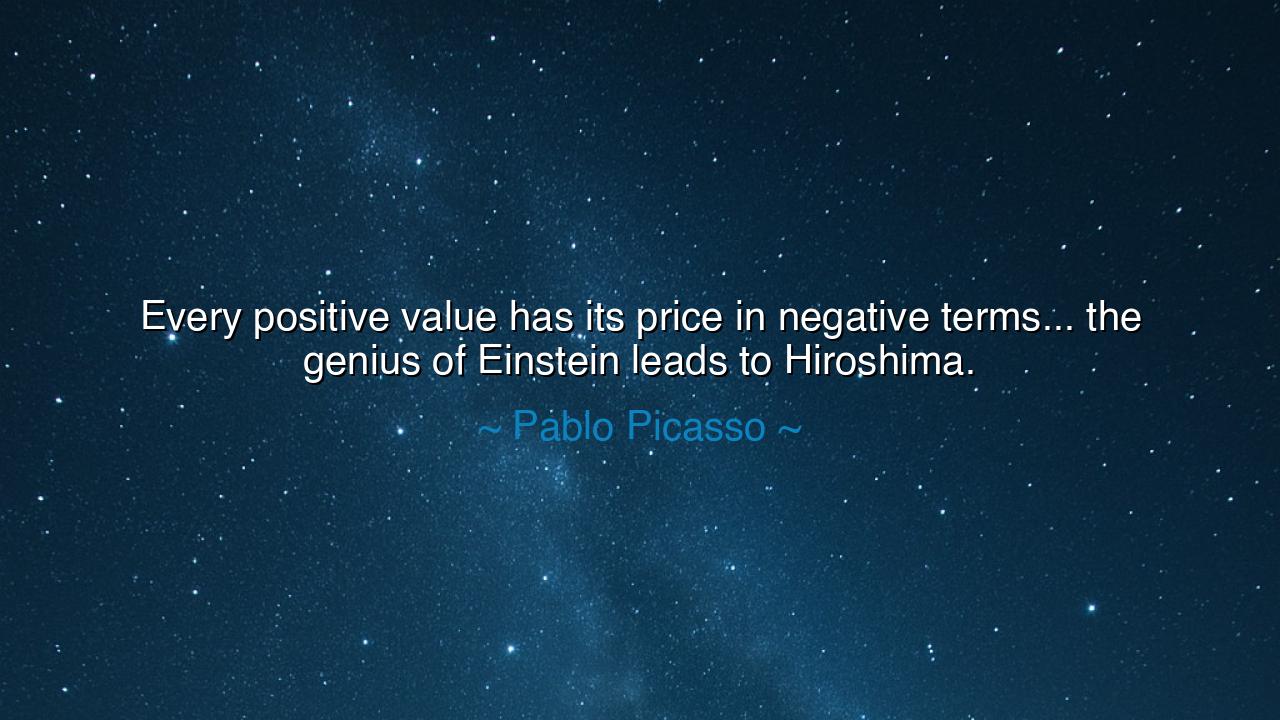
Every positive value has its price in negative terms... the
Every positive value has its price in negative terms... the genius of Einstein leads to Hiroshima.






Hear the heavy words of the artist-seer, Pablo Picasso, who declared: “Every positive value has its price in negative terms… the genius of Einstein leads to Hiroshima.” This is not the voice of cynicism, but of sobering truth, spoken by one who had seen the devastations of war and the double-edged nature of human invention. Picasso, who painted Guernica to cry out against the horrors of bombing, knew that every gift of man, however radiant, casts a shadow. For in the hands of the wise, genius may build; but in the hands of the reckless, it may destroy.
The meaning of this saying is profound: no triumph of the human spirit is without its cost. Fire warms the hearth but burns the forest. Iron builds the plough but also the sword. The genius of Einstein, whose discoveries opened the universe to human wonder, also unlocked the path to the atomic bomb. What was born as knowledge became, in another man’s hand, a weapon. Thus every positive value, every achievement, carries within it the possibility of its opposite. The higher the gift, the greater the peril.
History itself provides the sharpest witness. In 1945, the light of modern science culminated in the fireball over Hiroshima. Einstein himself had not built the bomb, and yet his theories of relativity made its existence possible. In despair, he later confessed, “If only I had known, I should have become a watchmaker.” The discovery of nuclear power—capable of providing boundless energy for humanity—was twisted into an instrument of annihilation. Thus Picasso reminds us: progress is not pure. Each step forward carries with it the risk of shadow.
But this truth is not cause for despair; it is a call to responsibility. For the problem does not lie in the value itself, nor in the genius, but in how humanity wields it. Knowledge without wisdom becomes peril. Power without compassion becomes ruin. The seed of destruction is not the gift but the heart that chooses how to use it. The ancients knew this well: Prometheus stole fire from the gods to uplift mankind, yet with fire came both warmth and war. So too today, every invention of our hands demands vigilance from our souls.
The lesson, therefore, is that we must balance our pursuit of greatness with the cultivation of conscience. Let us not only seek to create, but also to guard, to guide, to foresee the shadows that accompany every light. It is not enough to admire genius; we must also cultivate morality to govern it. The artist, the scientist, the leader—each must ask not only, “What can I do?” but also, “What will this mean for the generations after me?”
For us who live in this age of swift invention, the call is practical and urgent. When we discover new tools, let us ask how they might heal rather than harm. When we wield knowledge, let us cloak it in compassion. When we innovate, let us also educate the heart, so that wisdom walks hand in hand with brilliance. Each of us, in smaller ways, faces this same balance in daily life—our words can uplift or wound, our labor can serve or exploit, our choices can build bridges or dig graves.
Thus, Picasso’s words are not a curse upon progress but a warning and a guide. *“Every positive value has its price in **negative terms… the genius of Einstein leads to *Hiroshima.” Let us take this as a reminder that greatness demands responsibility. The brighter the torch, the darker the shadow it casts. But if we walk wisely, we can turn even the greatest power toward light. Let us then be not only seekers of knowledge but guardians of its use, so that the fire of our age may illuminate, and not consume, the world.






AAdministratorAdministrator
Welcome, honored guests. Please leave a comment, we will respond soon